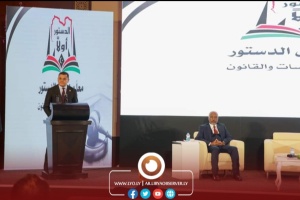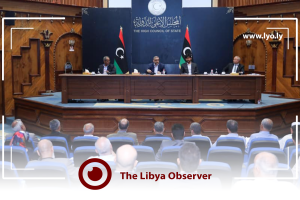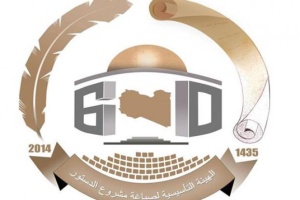Chapter five of the Libyan constitution draft that was approved by the Constituent Assembly on July 29
Libya Constitution – Chapter Five

Chapter Five- Constitutional Court
Article 135: Independence of the Constitutional Court
A Constitutional Court shall be established to enjoy legal personality as well as administrative and financial independence. It shall submit its draft budget to the legislative authority and its opinion shall be sought on draft laws that relate to it. Its members shall enjoy safeguards and advantages prescribed for members of the judiciary. Its headquarters shall be in Sabha and it may hold its hearings and practice its competences elsewhere in the country.
Article 136: Composition of the Court
The Constitutional Court shall comprise twelve members, including a president and a deputy. The Higher Judicial Council shall select six judges at the level of president at the Court of Appeals, the President of the Republic shall select three members, and the legislative authority shall select three members. Those selected by the President and legislative authority shall be experienced attorneys, who hold as a minimum an advanced degree in the areas of law, political science, and Islamic Sharia, and who are not members of the judicial authority. Their practical experience in their area of expertise shall be no less than twenty years. The President and deputy of the Court shall be among the members selected by the Higher Judiciary Council through its General Assembly.
Vacant memberships shall be filled by the same selection authority and in accordance with the same criteria. They shall all be designated by a decree issued by the President of the Republic.
Article 137: Oath of the Constitutional Court members
The Constitutional Court member shall take his oath before the Shura Council prior to assuming his duties according to the following formulation: In the name of the Almighty God, I swear that I will be faithful to God and the homeland, I will respect the Constitution and the law, and I will perform my duties with honesty and sincerity.
Article 138: Terms of Membership
It is required that members of the Court be Libyans, who hold no other nationality, not married to a foreigner no less than forty five years of age and not affiliated with any political party. It shall not be permissible to exercise any other function or work during their membership in the Court. Membership shall last eight years for one term, and half of them shall be renewed every four years according to the principle of rotation. Workflow procedures, rights and duties of the members of the court and other functional affairs shall be regulated by law.
Article 139: Competences of the Court
The Constitutional Court shall have the exclusive jurisdiction over the following:
1- Judicial oversight of the constitutionality of laws and regulations of the House of Representatives and the Senate.
2- Consideration of the constitutionality of constitutional amendments procedures.
3- Litigation relating to failure of the legislative authority to fulfill its constitutional obligations.
4- Challenges against the presidential elections.
5- Decision on disputes arising from the implementation of its sentences.
6- Review of international treaties and conventions referred thereto by the Senate prior to ratification.
7- Review of electoral and referenda laws before their issuance.
8- Review of laws ruled unconstitutional before their issuance.
9- Any other area of jurisdiction prescribed by the Constitution.
Article 140: Sentences and Decisions of the Court
The Court shall render justified rulings and decisions by majority. The Court may reverse the principles it established as specified by law.
Article 141: Appeal before the Court
Any individual with an interest may resort to the Constitutional Court to challenge, whether directly or via serious motion, the unconstitutionality of case that is being considered before the courts, as regulated by the law.
Article 142: Authority of Sentences and Decisions of the Court
The rulings and decisions of the Constitutional Court shall be final and binding for all, and shall be published in the Official Gazette. Any text ruled as unconstitutional by the Court shall lose its binding force on the day following the publication of the ruling. The Court may, on exigent basis, determine the effective date of the ruling of unconstitutionality.







